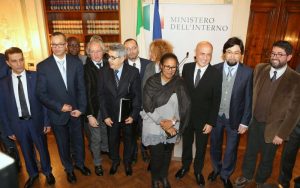NEWS ‘Agreement for an Italian Islam’ Signed in Rome
Nine Islamic associations and the Italian Ministry of Interior signed a “National agreement for an Italian Islam” in Rome last week.
The 20-point Agreement – the first of this kind in Italy – is intended to regulate the Islamic reality in Italy and to “reject all forms of violence and terrorism,” with prayers in mosques to be held in Italian.
“It’s a very important document that concerns the present and future of our country through inter-religious dialogue, starting from a basic principle: we may have different religions, but we are all Italian,” said Interior Minister Marco Minniti. “One of the essential points is that all the signatories have committed to reject all forms of violence and terrorism,” explained Minniti.
Pagine Ebraiche spoke with Maryan Ismail, president of Somalian Mothers and Children Association, and with imam Yaya Pallavicini, vice-president of the Islamic Religious Community (Coreis). Both of them signed the Agreement (all the nine associations together represent the 70 per cent of the Muslims living in Italy – 1.4 million people in total).
Ismail said that the pact is a positive first step because “it recognizes the differences inside the Italian Islamic world and paves the way to each community to sign with the State a specific agreement. It is also important because it recognize the women’s role inside the religion,” added Ismail, who explained that she will be the first woman to take part to the training course for Imams and religious leaders which will be created as a result of the agreement.
Imam Pallavicini described the agreement as “an important declaration of intent” that now “have to be implemented. Now we have to decide methods, content and the organizational structures” that the Italian Islam have to adopt.
Ismail and Pallavicini said that transparency and traceability of the funds that each organization receives is essential. “There are foreign countries that are financing Italian mosques and communities. We have to make sure about how this money is used and that those countries don’t have the chance to influence the political views of the communities they are financing,” said Pallavicini.
Another problematic issue is the anti-Semitic prejudice within the Muslim community. Both Pallavicini and Ismail recognize that it is an international problem. “We have to teach everyone that the respect of the Jewish identity is not negotiable,” said the imam. “We have to fight every form of anti-Semitism, also when is disguised as anti-Zionism – added Ismail – A debate about it in the Muslim community is needed.”

